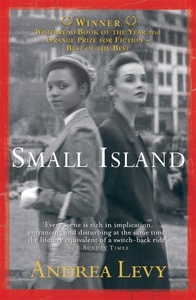Take a photo of a barcode or cover
I have had this on my shelf for over 10 years. I don't know why I never picked it up I always seemed to pass it over for other things until now.
I wonder if I had read it 10 years ago it would have impacted me as much as it did now. It felt particularly poignant in the present climate in the UK with the Windrush scandal and people like Gilbert and Hortense being threatened with deportation after living here most of their adult lives.
This book is a slow starter and I really struggled in the first quarter. I thought about discarding it but 10+ years on my shelf meant I just couldn't do it and I am glad I didn't because eventually it captured me and by the end...well it made me cry.
I think it showed so powerful how everyone is diminished by racism. That Queenie's internal racism results in her giving up her child. The Bernard's experiences in India only serve to darken and confirm him racism. That being part of a colonising force meant his experience was violent and dangerous and heightening his dislike of 'others'. Colonisation fails them all really in some way. The British Empire is the real villain there is no doubt about that.
Although at the end you feel that maybe Gilbert and Hortense have more of a potential for a future than Bernard and Queenie who are so crippled by the expectations on them, race, class, gender etc that they are shadows of the people they really are beneath all that.
A powerful and thought-provoking read. It might have taken me years to get to it but it was a worthy read in the end.
I wonder if I had read it 10 years ago it would have impacted me as much as it did now. It felt particularly poignant in the present climate in the UK with the Windrush scandal and people like Gilbert and Hortense being threatened with deportation after living here most of their adult lives.
This book is a slow starter and I really struggled in the first quarter. I thought about discarding it but 10+ years on my shelf meant I just couldn't do it and I am glad I didn't because eventually it captured me and by the end...well it made me cry.
I think it showed so powerful how everyone is diminished by racism. That Queenie's internal racism results in her giving up her child. The Bernard's experiences in India only serve to darken and confirm him racism. That being part of a colonising force meant his experience was violent and dangerous and heightening his dislike of 'others'. Colonisation fails them all really in some way. The British Empire is the real villain there is no doubt about that.
Although at the end you feel that maybe Gilbert and Hortense have more of a potential for a future than Bernard and Queenie who are so crippled by the expectations on them, race, class, gender etc that they are shadows of the people they really are beneath all that.
A powerful and thought-provoking read. It might have taken me years to get to it but it was a worthy read in the end.
challenging
dark
emotional
hopeful
medium-paced
Plot or Character Driven:
A mix
Strong character development:
Yes
Loveable characters:
Yes
Diverse cast of characters:
Yes
Flaws of characters a main focus:
Yes
Loved these characters. Really felt like this was a true story.
Told through perspectives. In my opinion, the . Often heartbreaking.
Read for the Popsugar 2021 Challenge Prompt: A book that has won the Women's Prize For Fiction (which used to be known as the Orange Prize).
Spoiler
fourSpoiler
fourth perspective, Bernard's really leads to the crash ending of the bookRead for the Popsugar 2021 Challenge Prompt: A book that has won the Women's Prize For Fiction (which used to be known as the Orange Prize).
Full review here: lisaloparo.wordpress.com/2013/11/08/smallisland/
Having just bought another copy of this book, I found myself reopening it at random and reading paragraphs here and there, and I was absorbed yet again. Small Island is a book I probably wouldn’t have read if it weren’t assigned reading in my study abroad class in London, but now that I’ve read it (and seen the BBC adaptation with Benedict Cumberbatch) I find myself thinking about it all the time. Small Island is the story of the influx of Jamaican immigrants to London following World War II. When the British economy was collapsing and good ol’ Mother England found herself in need of cheap labor, she opened her ports to the denizens of her former colonies. Small Island dramatizes the real results of this historic event.Photo Nov 08, 1 33 26 PM
A lively cast of characters propels the events in this novel. First there is Queenie Bligh, a modest woman who comes from poor beginnings in the wild North of England who marries up. Her husband, Bernard, is a proud yet cowardly man touched by bigotry who is nevertheless capable of astonishing kindness. The husband and wife come into contact with a pair of Jamaican immigrants, Gilbert and Hortense Joseph, who enter into a marriage of convenience and find that their perception of England as the kind “mother country” is far from the reality.
The foursome each take their turn at narrating this gorgeous novel, which only rarely falls into cliché. The four first-person narratives are intertwined which could easily have been confusing and tedious, but each character has such a distinctive voice and strong personality that it is so easy to get caught up in the story and become seriously emotionally invested in the characters. It’s akin to reading a very detailed diary.
Levy adds to the story, as the daughter of Jamaican parents, the use of Jamaican Patois (or Creole) in the narratives of Hortense and Gilbert. This accurate use of language lends another level of reality to the events and allows readers a more in-depth insight into the thought processes of the characters. It’s like when you watch a British movie and start thinking in a British accent (or something like that). I never felt like the author was present in the book; her voice was completely superseded by her characters’, which is the mark of a well-written first-person novel. Four first-persons, to be exact.
The novel’s poignance lies in the depiction of the reality of life for many Jamaican immigrants. Their lives were full of hardships from the second they stepped onto English soil. Many were met with violent racism, turned away from jobs because of their race, and lived in government housing with terrible conditions. Moreover, many found that their perception of England as loving “mother country” was little more than propaganda. In the novel, Gilbert says:
All we ex-RAF servicemen who, lordly in our knowledge of England, had looked to those stay-at-home boys to inform them that we knew what to expect from the Mother Country. The lion’s mouth may be open…but we had counted all its teeth….only now were we ex-servicemen starting to feel its bite. (268-269)
The novel takes you deep inside the cultural history of Britain during this time period and inspires sympathy for the characters, both black and white.
The historical setting is well presented and the characters are strong and well-developed but the real beauty of this novel is how it tugs at your heartstrings (Yes, I’m a sap, let’s move on). While Bernard is away fighting in India and briefly MIA, Queenie meets and falls in love with Michael, a Jamaican immigrant and ex-RAF soldier. The two enjoy a brief affair but Queenie is crushed when Michael leaves for Canada and does not invite her to accompany him. Unbeknownst to Michael, Queenie bears his child, a biracial child whom Queenie knows will face enormous social obstacles in his life with a white mother in a racist world. Bernard, when he learns of his wife’s infidelity and more importantly, the race of the man who impregnated his wife, surprisingly accepts the responsibility of raising his wife’s illegitimate child as his own, despite the child’s race. Queenie’s heartbroken response sheds bright light on the difficulties blacks faced in England in the 1940s:
He’s coloured, Bernard…and he’s not your son…You might think you can do it now while he’s a little baby saying nothing. But what about when he grows up? A big, strapping coloured lad. And people snigger at you in the street and ask you all sorts of awkward questions. Are you going to fight for him?….Are you going to be proud of him? Glad that he’s your son?….One day he’ll do something naughty and you’ll look at him and think, The little black bastard, because you’ll be angry. And he’ll see it in your eyes. You’ll be angry with him not only for that. But because the neighbours never invited you round….And all because you had a coloured child. (431)
I have to say, even if this book never crosses your path, take the time to watch the BBC film. The acting is top-notch and the ending will make you cry (me cry—it’ll make me cry).
Having just bought another copy of this book, I found myself reopening it at random and reading paragraphs here and there, and I was absorbed yet again. Small Island is a book I probably wouldn’t have read if it weren’t assigned reading in my study abroad class in London, but now that I’ve read it (and seen the BBC adaptation with Benedict Cumberbatch) I find myself thinking about it all the time. Small Island is the story of the influx of Jamaican immigrants to London following World War II. When the British economy was collapsing and good ol’ Mother England found herself in need of cheap labor, she opened her ports to the denizens of her former colonies. Small Island dramatizes the real results of this historic event.Photo Nov 08, 1 33 26 PM
A lively cast of characters propels the events in this novel. First there is Queenie Bligh, a modest woman who comes from poor beginnings in the wild North of England who marries up. Her husband, Bernard, is a proud yet cowardly man touched by bigotry who is nevertheless capable of astonishing kindness. The husband and wife come into contact with a pair of Jamaican immigrants, Gilbert and Hortense Joseph, who enter into a marriage of convenience and find that their perception of England as the kind “mother country” is far from the reality.
The foursome each take their turn at narrating this gorgeous novel, which only rarely falls into cliché. The four first-person narratives are intertwined which could easily have been confusing and tedious, but each character has such a distinctive voice and strong personality that it is so easy to get caught up in the story and become seriously emotionally invested in the characters. It’s akin to reading a very detailed diary.
Levy adds to the story, as the daughter of Jamaican parents, the use of Jamaican Patois (or Creole) in the narratives of Hortense and Gilbert. This accurate use of language lends another level of reality to the events and allows readers a more in-depth insight into the thought processes of the characters. It’s like when you watch a British movie and start thinking in a British accent (or something like that). I never felt like the author was present in the book; her voice was completely superseded by her characters’, which is the mark of a well-written first-person novel. Four first-persons, to be exact.
The novel’s poignance lies in the depiction of the reality of life for many Jamaican immigrants. Their lives were full of hardships from the second they stepped onto English soil. Many were met with violent racism, turned away from jobs because of their race, and lived in government housing with terrible conditions. Moreover, many found that their perception of England as loving “mother country” was little more than propaganda. In the novel, Gilbert says:
All we ex-RAF servicemen who, lordly in our knowledge of England, had looked to those stay-at-home boys to inform them that we knew what to expect from the Mother Country. The lion’s mouth may be open…but we had counted all its teeth….only now were we ex-servicemen starting to feel its bite. (268-269)
The novel takes you deep inside the cultural history of Britain during this time period and inspires sympathy for the characters, both black and white.
The historical setting is well presented and the characters are strong and well-developed but the real beauty of this novel is how it tugs at your heartstrings (Yes, I’m a sap, let’s move on). While Bernard is away fighting in India and briefly MIA, Queenie meets and falls in love with Michael, a Jamaican immigrant and ex-RAF soldier. The two enjoy a brief affair but Queenie is crushed when Michael leaves for Canada and does not invite her to accompany him. Unbeknownst to Michael, Queenie bears his child, a biracial child whom Queenie knows will face enormous social obstacles in his life with a white mother in a racist world. Bernard, when he learns of his wife’s infidelity and more importantly, the race of the man who impregnated his wife, surprisingly accepts the responsibility of raising his wife’s illegitimate child as his own, despite the child’s race. Queenie’s heartbroken response sheds bright light on the difficulties blacks faced in England in the 1940s:
He’s coloured, Bernard…and he’s not your son…You might think you can do it now while he’s a little baby saying nothing. But what about when he grows up? A big, strapping coloured lad. And people snigger at you in the street and ask you all sorts of awkward questions. Are you going to fight for him?….Are you going to be proud of him? Glad that he’s your son?….One day he’ll do something naughty and you’ll look at him and think, The little black bastard, because you’ll be angry. And he’ll see it in your eyes. You’ll be angry with him not only for that. But because the neighbours never invited you round….And all because you had a coloured child. (431)
I have to say, even if this book never crosses your path, take the time to watch the BBC film. The acting is top-notch and the ending will make you cry (me cry—it’ll make me cry).
emotional
reflective
sad
slow-paced
Plot or Character Driven:
A mix
Strong character development:
Yes
Loveable characters:
Complicated
Diverse cast of characters:
Yes
Flaws of characters a main focus:
Complicated
emotional
reflective
medium-paced
Plot or Character Driven:
Character
Strong character development:
Yes
Loveable characters:
Complicated
Diverse cast of characters:
Yes
Flaws of characters a main focus:
Yes
challenging
emotional
funny
reflective
medium-paced
Plot or Character Driven:
A mix
Strong character development:
Yes
Loveable characters:
Yes
Diverse cast of characters:
Yes
Flaws of characters a main focus:
No
challenging
emotional
inspiring
lighthearted
reflective
sad
medium-paced
Plot or Character Driven:
A mix
Strong character development:
Yes
Loveable characters:
Yes
Diverse cast of characters:
Yes
Flaws of characters a main focus:
Yes
emotional
reflective
medium-paced
Plot or Character Driven:
Character
Strong character development:
Yes
Loveable characters:
Complicated
Diverse cast of characters:
Yes
Flaws of characters a main focus:
Yes



